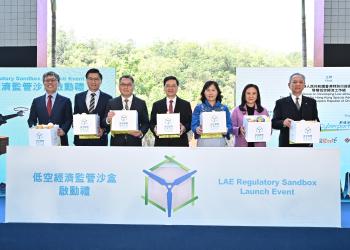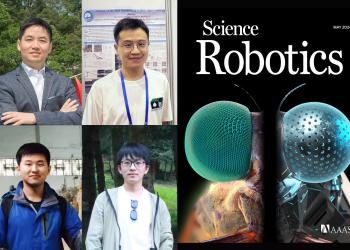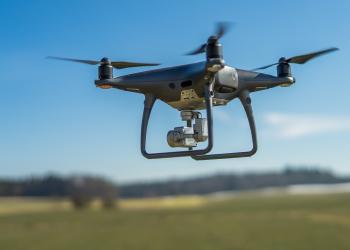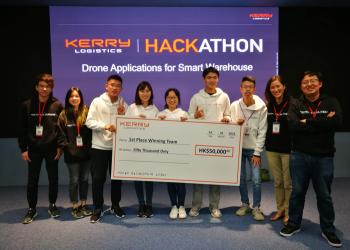News & Stories
2025
Stories
Navigating the Skies: HKUST’s Game-Changing Digital Twin
For many, sticking to familiar paths feels safe and comfortable. But not for the trailblazers at the Hong Kong University of Science and Technology (HKUST). They are not just thinking outside the box—they are pushing boundaries and aiming for the skies—quite literally.
At HKUST’s Low Altitude Economy Research Center (LAERC), researchers are revolutionizing the future of urban airspace to support HKSAR Government’s policy in promoting the low-altitude economy. Their mission? Harnessing the groundbreaking Digital Twin technology—a virtual replica of the physical world—to transform drone management, airspace control, and infrastructure monitoring.
Spearheaded by Professor Jack CHENG of the Department of Civil and Environmental Engineering, this innovative technology is set to unlock unprecedented potential for the low-altitude economy.

News
Government Launches Regulatory Sandbox Pilot Projects at HKUST
The Government announced today (March 20) the list of the first batch of low-altitude economy (LAE) Regulatory Sandbox pilot projects, which will be rolled out progressively, to enable members of the public to "see and feel" the tangible benefits of the LAE. These projects will also allow the Government and relevant sectors to simulate diversified scenarios, multiple air routes and overarching low-altitude airspace management matters, while accumulating data and experience to guide the work on multiple fronts including regulations, infrastructure, and applications.
2024

News
HKUST Develops Groundbreaking Artificial Compound Eye to Revolutionize Robotic Vision at Lower Cost but Higher Sensitivity
A research team at the School of Engineering of the Hong Kong University of Science and Technology (HKUST) has recently developed a novel artificial compound eye system that is not only more cost-effective, but demonstrates a sensitivity at least twice that of existing market products in small areas. The system promises to revolutionize robotic vision, enhance robots' abilities in navigation, perception and decision-making, while promoting commercial application and further development in human-robot collaboration.
2019

News
Over-regulation of Drones Just Doesn't Fly
Unmanned aircraft systems started to gain attention in US military operations more than a decade ago, but nowadays, people enjoy flying drones for photography and videography purposes.
Drones are also gaining widespread acceptance for goods delivery, surveying and scientific research.
I have two recreational drones, so I was eager to examine the three-month drone regulation proposals put out by the Civil Aviation Department in late 2017.
There are six recommendations for the UAS regulatory regime: a registration system; risk-based classification of operations; training and assessment requirements; drone maps; insurance requirements; and indoor operations.
The recommendations are sound, but a number of salient issues were omitted.
The first is the absence of regulations governing drone manufacturers.

News
Engineering Student Team Crowned Champion at Smart Warehouse Hackathon
A team of 5 HKUST School of Engineering (SENG) students brought home the championship at the Kerry Logistics Hackathon in February, a competition that sought to explore the possibility of using drones to help run smart warehouses.
Joined by 50 local undergraduate and postgraduate students in 8 groups, as well as 50 industry participants, the competition comprised two sessions.
In the “Drone Flying Competition” session, contestants had to create the best path for the drone to race and capture information about the warehouse at the Kerry Cargo Centre in Kwai Chung, by leveraging the power of autonomous drones and Artificial Intelligence (AI) techniques in this 24-hour overnight hackathon. Contestants were judged on criteria such as how accurate, efficient, stable and well-planned their drone flights were.

News
High Time for Clarity on Sea Emissions
By Prof. Ning Zhi, Associate Professor of Environment and Sustainability
Marine emissions account for 40 percent of air pollution sources in Hong Kong - making them one of the city's most significant pollutant sources.
Given the SAR's status as one of the busiest ports in the world, enforcing clean fuel laws is absolutely essential in our quest to clean up our air.
Traditionally, policing high sulfur fuel usage is a time-consuming affair: checking ship logs, collecting samples from fuel tanks, taking them back to the lab and then conducting analyses. This process takes days and even weeks.
By the time these measurements are complete, the ships are likely to be already far from Hong Kong.
Regulators have been looking for a more efficient solution to detect and screen the vessels violating the fuel sulfur cap regulations.








